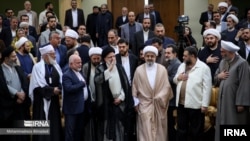Iran showed signs of close coordination with its Palestinian militant proxies in the weeks before and immediately after Hamas launched Saturday’s surprise attacks on Israel from Gaza, observers tell VOA.
Iranian Foreign Minister Hossein Amir-Abdollahian held “an extended meeting” with the leaders of Hamas and Palestinian Islamic Jihad, a smaller Gaza-based militant group, in Beirut on September 1, according to Iran’s state-approved agency Tasnim. “Both sides laid emphasis on the need for the liberation of Palestine from Israeli occupation,” the report said.
Iran is a key supplier of military and financial assistance to Palestinian militants in Gaza.
More recently, Osama Hamdan — Hamas' representative in Lebanon — was in Tehran earlier this month for an Islamic Unity Conference. In a report published Oct. 4, Tasnim said he spoke to participants about the need for “all Islamist parties to do everything in their power to liberate Al-Quds [Jerusalem],” a euphemism for destroying Israel.
Hamdan also was seen standing an arm’s length from Iranian President Ebrahim Raisi at the conference’s opening ceremony on Oct. 1, in a photo published by state news agency IRNA.
The recent meetings indicate “significant coordination” between Iran and Hamas, said Jason Brodsky, policy director of U.S. advocacy group United Against Nuclear Iran, or UANI, in a VOA Persian interview.
Four days before Hamas started its assault, Iranian Supreme Leader Ayatollah Ali Khamenei posted a message on the X social media platform, saying the “usurper regime,” a reference to Israel, “is coming to an end.”
He added: “Today, the Palestinian youth and the anti-oppression, anti-occupation movement in Palestine is more energetic, more alive, and more prepared than ever during the past 70 or 80 years. God willing, the movement will achieve its goals.”
As Saturday’s attacks began, online images posted by Hamas were reposted within minutes by Iranian social media channels affiliated with Iran’s Islamic Revolutionary Guard Corps, said Israeli analyst Alexander Grinberg of Haifa University’s Ezri Center for Iran and Gulf States Research in a message to VOA.
Grinberg cited as an example a video apparently filmed by Palestinian militants as they transported a captured Israeli in a truck. The video was reposted by a Telegram account bearing the IRGC insignia with more than 400,000 followers.
Iranian officials also were quick to praise the Hamas attacks in comments published by state media.
The Fars news agency quoted IRGC Major General Yahya Rahim Safavi, a military adviser to Khamenei, as saying: “We will stand by the Palestinian fighters until the liberation of Palestine and Al-Quds [Jerusalem].”
Israeli Major General (Ret.) Yaakov Amidror, a former national security adviser to Israeli Prime Minister Benjamin Netanyahu, told VOA in a phone call Saturday it is too early to determine what role Iran may have played in the planning and execution of the Hamas assault.
“That can be known only after an investigation,” Amidror said. “Part of that investigation will be done parallel to Israel’s military response, but most of it probably will be after the operation.”
A senior White House official echoed Amidror’s assessment in a call with reporters. Requesting anonymity to discuss diplomatic communications, the official said it was too early to establish the extent of Iran’s support for the assault. “We’re going to be looking at that very closely,” the official added.
Amidror said that if an investigation finds clear evidence of Iran’s direct involvement in the attacks, there is “no question” that Israel will make great efforts to show Iran’s Islamist rulers that “there is a price.”
“The fact that the assault was carried out by proxies will not save them,” Amidror said.
Several analysts interviewed by VOA Persian said Iran has multiple motivations for supporting the timing of the Hamas assault.
“For the Iranian regime, the Palestine issue has been one of its few sources of legitimacy,” said David Romano, a Middle East politics professor at Missouri State University. “Especially at a time when the regime’s legitimacy is in crisis amongst its own population, the Palestine issue has offered the mullahs in Iran a low-cost means of burnishing their credentials and getting some legitimacy especially amongst their core constituency.”
Iran’s Islamist leadership faced the biggest challenge so far to its 44-year rule when nationwide protests calling for regime change erupted last September and continued into this year. Iranian authorities suppressed the protests with a violent crackdown that rights activists said killed hundreds and imprisoned thousands more.
Alireza Nourizadeh, a London-based Mideast analyst, said another factor behind Iran’s support is recent steps by Israel and Saudi Arabia, another rival of Iran, toward normalizing their relations. Riyadh hosted visits by two Israeli ministers in recent weeks, marking the first such public visits by senior Israeli officials to the Gulf state.
The U.S. has been encouraging an Israeli-Saudi normalization as an extension of the Abraham Accords, which have seen Israel open full diplomatic relations in recent years with the United Arab Emirates, Bahrain and Morocco.
“Khamenei was terrified that Saudi Arabia is normalizing relations with Israel,” Nourizadeh said.
Tehran and Riyadh engaged in their own normalization process earlier this year, re-opening embassies in each other’s capitals after a seven-year break in ties.
UANI’s Brodsky pointed to this year’s political turmoil in Israel as an additional factor.
“The Islamic republic likely calculates that it can get away with this escalation because of what it perceives as deep internal divisions in Israel over the judicial reform proposals that Netanyahu government has been trying to implement,” Brodsky said.
“That issue, and the regime’s desire to torpedo any extension of the Abraham Accords, likely have increased its risk tolerance to push the envelope against Israel,” he noted.
Kourosh Aladin and other members of VOA’s Persian Service contributed to this report.








